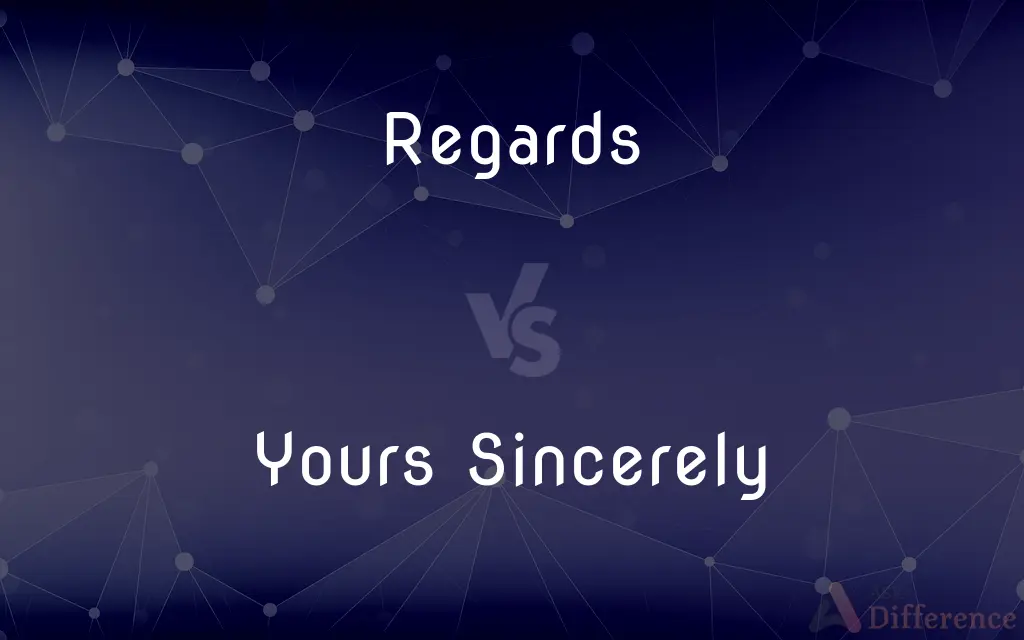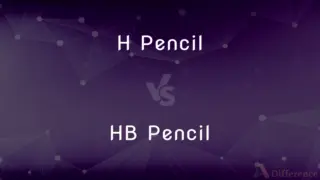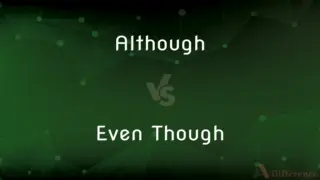Regards vs. Yours Sincerely — What's the Difference?
Edited by Tayyaba Rehman — By Fiza Rafique — Published on November 3, 2023
"Regards" is a general, polite closing for correspondence, while "Yours Sincerely" is a formal valediction typically used in British English when the recipient's name is known. Both signify the end of a message.

Difference Between Regards and Yours Sincerely
Table of Contents
ADVERTISEMENT
Key Differences
"Regards" is a commonly used closing in both personal and professional communication. It's versatile and can fit various levels of formality. "Yours Sincerely," on the other hand, carries a distinctly formal tone and is traditionally used in letters when the writer is familiar with the recipient's name.
In the context of American English, "Regards" is more widely recognized and utilized than "Yours Sincerely." While "Yours Sincerely" is primarily a British English convention, "Regards" has universal acceptance across various English-speaking regions.
One might opt for "Regards" in emails, notes, or letters when looking for a neutral, universally acceptable closing. "Yours Sincerely" is more specific to formal letters, particularly in settings where traditional British English correspondence etiquette is observed.
Although "Regards" is broadly accepted and can be seen in diverse contexts, "Yours Sincerely" implies a certain level of professionalism and decorum. It's crucial to choose the appropriate closing based on the nature of the communication and the relationship with the recipient.
Both "Regards" and "Yours Sincerely" serve the essential purpose of concluding a written piece respectfully. However, the choice between them should be influenced by the cultural, professional, and personal nuances of the communication.
ADVERTISEMENT
Comparison Chart
Tone
Neutral
Formal
Usage
Universal
Primarily British English
Context
Emails, notes, letters
Formal letters
Relationship
General
Known recipient
Position in Correspondence
Closing
Formal valediction
Compare with Definitions
Regards
A polite way to conclude a message.
Let me know if you have any questions. Regards, Sarah.
Yours Sincerely
An ending primarily for formal letters in traditional settings.
Please find the attached report for review. Yours Sincerely, Amelia.
Regards
An expression of goodwill at the end of a letter.
Send my regards to your family.
Yours Sincerely
A closing used when the recipient's name is known.
Thank you for considering my application. Yours Sincerely, Olivia.
Regards
A neutral valediction in written communication.
I'll keep you posted. Regards, Emily.
Yours Sincerely
A conclusion signaling decorum in written communication.
I await your feedback. Yours Sincerely, Daniel.
Regards
To think of or consider in a particular way
I regard him as a fool.
Yours Sincerely
A sign-off denoting respect and professionalism.
I appreciate your time and effort. Yours Sincerely, Lucas.
Regards
To look at attentively; observe closely
"He regarded the delicate lines of her profile" (Thomas Hardy).
Yours Sincerely
A formal valediction in British English correspondence.
I look forward to your prompt response. Yours Sincerely, James.
Regards
To relate or refer to; concern
This item regards their liability.
Regards
(Archaic) To take into account; consider.
Regards
To give heed; pay attention.
Regards
To look or gaze.
Regards
Careful thought or attention; heed
She gives little regard to her sister's teasing.
Regards
Respect, affection, or esteem
He has little regard for your work.
Regards
Regards Good wishes expressing such sentiment
Give the family my best regards.
Regards
A particular point or aspect; respect
She was lucky in that regard.
Regards
A look or gaze
"Such quick regards his sparkling eyes bestow" (Alexander Pope).
Regards
(Obsolete) Appearance or aspect.
Regards
Plural of regard
Regards
(pluralonly) Good wishes.
Regards
A greeting to pass on to another person.
Give my regards to your brother when you next see him.
Regards
(pluralonly) A greeting at the end of a letter or e-mail communication.
Regards, John. Kind regards, Peter.
Regards
A standard sign-off in correspondence.
I hope to hear from you soon. Regards, John.
Regards
A universal closing in both formal and informal communication.
Thanks for the update. Regards, Mike.
Common Curiosities
Is "Regards" suitable for business emails?
Yes, "Regards" is versatile and can be used in both personal and business correspondence.
Is "Best Regards" the same as "Regards"?
"Best Regards" is just a slightly warmer variation of "Regards."
Is "Regards" appropriate for all types of letters?
"Regards" is versatile but might not fit extremely formal or somber contexts.
Are there alternatives to "Regards"?
Yes, some include "Best," "Warm Regards," and "Kind Regards."
Is "Regards" more casual than "Yours Sincerely"?
Yes, "Regards" is generally more neutral, while "Yours Sincerely" is formal.
Can "Yours Sincerely" be used in emails?
Yes, but it's traditionally used in formal letters, especially in British English.
Which is more commonly used in the UK, "Regards" or "Yours Sincerely"?
Both are used, but "Yours Sincerely" has traditional roots in formal British correspondence.
Do Americans use "Yours Sincerely"?
It's less common in American English, which might prefer "Sincerely" alone.
Can I use "Yours Sincerely" in informal communication?
It might come off as overly formal in casual settings.
Can "Yours Sincerely" be used when the recipient's name is unknown?
Traditionally, "Yours Faithfully" is used for unknown recipients, while "Yours Sincerely" is for known names.
Can I use "Yours Sincerely" in personal letters?
Yes, especially if you're adhering to traditional British letter-writing etiquette.
Do "Regards" and "Yours Sincerely" have the same level of formality?
No, "Regards" is neutral, while "Yours Sincerely" is more formal.
Is "Regards" accepted in academic correspondence?
Yes, it's a neutral and widely accepted closing.
Is "Yours Sincerely" specific only to letters?
It's most traditional for letters but can be used in other formal written communications.
In which settings should I avoid using "Regards"?
In extremely formal or somber contexts, a more specific closing might be appropriate.
Share Your Discovery

Previous Comparison
H Pencil vs. HB Pencil
Next Comparison
Although vs. Even ThoughAuthor Spotlight
Written by
Fiza RafiqueFiza Rafique is a skilled content writer at AskDifference.com, where she meticulously refines and enhances written pieces. Drawing from her vast editorial expertise, Fiza ensures clarity, accuracy, and precision in every article. Passionate about language, she continually seeks to elevate the quality of content for readers worldwide.
Edited by
Tayyaba RehmanTayyaba Rehman is a distinguished writer, currently serving as a primary contributor to askdifference.com. As a researcher in semantics and etymology, Tayyaba's passion for the complexity of languages and their distinctions has found a perfect home on the platform. Tayyaba delves into the intricacies of language, distinguishing between commonly confused words and phrases, thereby providing clarity for readers worldwide.
















































